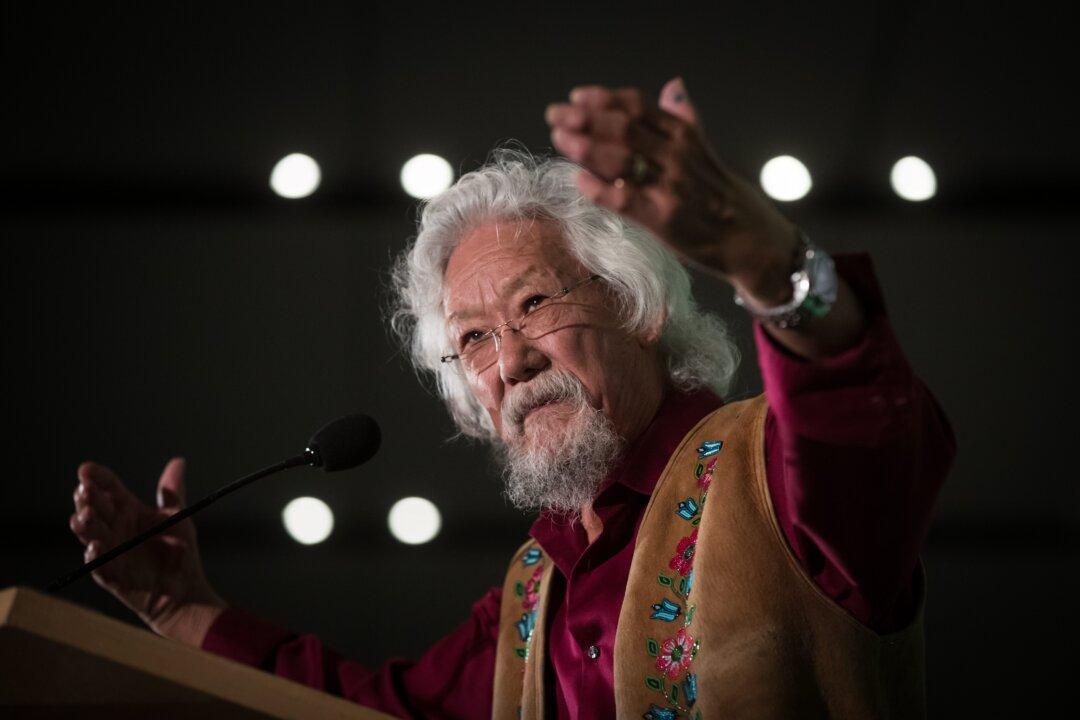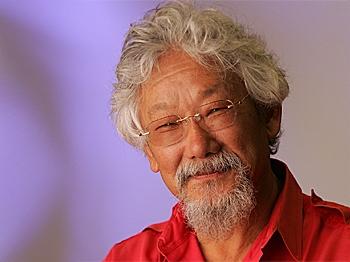Focus
David Suzuki
LATEST
|
Digging Out of Canada’s Mining Dilemma
It sometimes seems people in the mining and fossil fuel industries—along with their government promoters—don’t believe in the future. What else could explain the mad rush to extract and use up the Earth’s resources as quickly and wastefully as possible?
|
Energy Shift Requires Shift in Conversation
Abundant, cheap fossil fuels have driven explosive technological, industrial, and economic expansion for more than a century.
|
More Bad News for Bees: The New ‘F’ Word
Have you heard of flupyradifurone? Probably not, unless you work for the federal government agency poised to approve this new pesticide for use in Canada. But take note: This new “F” word is bad news for bees.
|
Clean-Tech Is Good for the Economy and Environment
What’s the fastest-growing sector in Canada’s economy? Given what you hear from politicians and the media, you'd be forgiven for thinking it’s the resource industry, especially extraction and export of fossil fuels like oil sands bitumen and liquefied natural gas. But we’re no longer just “hewers of wood and drawers of water”—or drillers of oil, frackers of gas, and miners of coal.
|
Commissioner’s Report Shows Canada Must Do More for Environment
Canadians expect to have our environment protected, and to know how it’s being protected. A report from Canada’s Commissioner of the Environment and Sustainable Development shows we’re being short-changed.
|
Let’s Slow Down, for the Sake of Ourselves and Our Planet
The Amazon rainforest is magnificent. Watching programs about it, we’re amazed by brilliant parrots and toucans, tapirs, anacondas, and jaguars. But if you ever go there expecting to be overwhelmed by a dazzling blur of activity, you'll be disappointed. The jungle has plenty of vegetation—hanging vines, enormous trees, bromeliads, and more — and a cacophony of insects and frogs. But much of the activity goes on at night or high up in the canopy.
|
Suzuki Must Set Positive Example in Climate Controversy
The climate debate is one of the most important discussions in the world today. At stake are billions of dollars, millions of jobs, and, if people like David Suzuki are right, the fate of the global environment. Consequently, we urgently need all parties in the discussion to behave responsibly.
|
Canada’s Cities Lead on Climate Action
Amid the dire warnings about global warming’s impacts, what’s often overlooked is that actions to reduce or prevent them will lead to livable communities, improved air quality, protection of natural spaces, and greater economic efficiency, to name just a few benefits. So it’s not surprising that tangible positive action on climate change is happening in Canada’s cities.
|
Lake Huron Is No Place for a Nuclear Waste Dump
Is dilution really the solution to pollution—especially when it’s nuclear waste that can stay radioactive for 100,000 years? A four-member expert group told a federal joint review panel it is.
|
It’s Time to Save the Bees and Ban Neonic Pesticides
Bees may be small, but they play a big role in human health and survival. Some experts say one of every three bites of food we eat depends on them. The insects pollinate everything from apples and zucchini to blueberries and almonds. If bees and other pollinators are at risk, entire terrestrial ecosystems are at risk, and so are we.
|
|
Digging Out of Canada’s Mining Dilemma
It sometimes seems people in the mining and fossil fuel industries—along with their government promoters—don’t believe in the future. What else could explain the mad rush to extract and use up the Earth’s resources as quickly and wastefully as possible?
|
Energy Shift Requires Shift in Conversation
Abundant, cheap fossil fuels have driven explosive technological, industrial, and economic expansion for more than a century.
|
More Bad News for Bees: The New ‘F’ Word
Have you heard of flupyradifurone? Probably not, unless you work for the federal government agency poised to approve this new pesticide for use in Canada. But take note: This new “F” word is bad news for bees.
|
Clean-Tech Is Good for the Economy and Environment
What’s the fastest-growing sector in Canada’s economy? Given what you hear from politicians and the media, you'd be forgiven for thinking it’s the resource industry, especially extraction and export of fossil fuels like oil sands bitumen and liquefied natural gas. But we’re no longer just “hewers of wood and drawers of water”—or drillers of oil, frackers of gas, and miners of coal.
|
Commissioner’s Report Shows Canada Must Do More for Environment
Canadians expect to have our environment protected, and to know how it’s being protected. A report from Canada’s Commissioner of the Environment and Sustainable Development shows we’re being short-changed.
|
Let’s Slow Down, for the Sake of Ourselves and Our Planet
The Amazon rainforest is magnificent. Watching programs about it, we’re amazed by brilliant parrots and toucans, tapirs, anacondas, and jaguars. But if you ever go there expecting to be overwhelmed by a dazzling blur of activity, you'll be disappointed. The jungle has plenty of vegetation—hanging vines, enormous trees, bromeliads, and more — and a cacophony of insects and frogs. But much of the activity goes on at night or high up in the canopy.
|
Suzuki Must Set Positive Example in Climate Controversy
The climate debate is one of the most important discussions in the world today. At stake are billions of dollars, millions of jobs, and, if people like David Suzuki are right, the fate of the global environment. Consequently, we urgently need all parties in the discussion to behave responsibly.
|
Canada’s Cities Lead on Climate Action
Amid the dire warnings about global warming’s impacts, what’s often overlooked is that actions to reduce or prevent them will lead to livable communities, improved air quality, protection of natural spaces, and greater economic efficiency, to name just a few benefits. So it’s not surprising that tangible positive action on climate change is happening in Canada’s cities.
|
Lake Huron Is No Place for a Nuclear Waste Dump
Is dilution really the solution to pollution—especially when it’s nuclear waste that can stay radioactive for 100,000 years? A four-member expert group told a federal joint review panel it is.
|
It’s Time to Save the Bees and Ban Neonic Pesticides
Bees may be small, but they play a big role in human health and survival. Some experts say one of every three bites of food we eat depends on them. The insects pollinate everything from apples and zucchini to blueberries and almonds. If bees and other pollinators are at risk, entire terrestrial ecosystems are at risk, and so are we.
|





